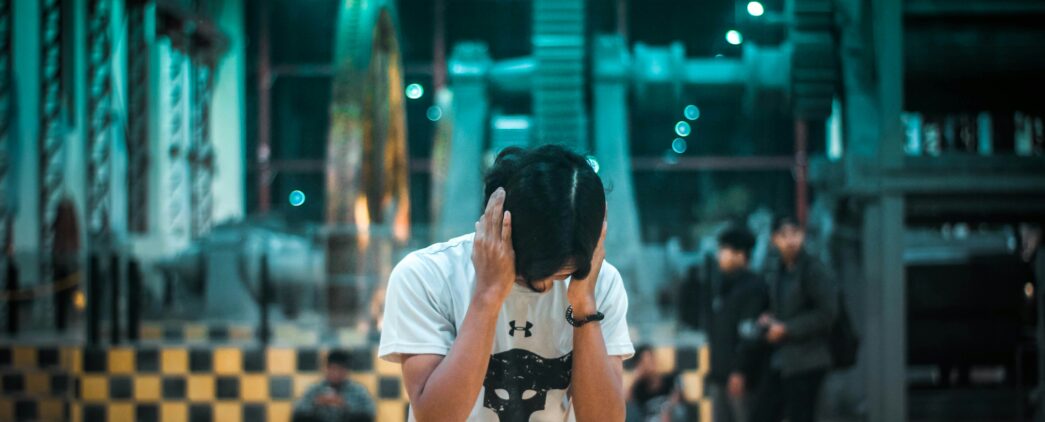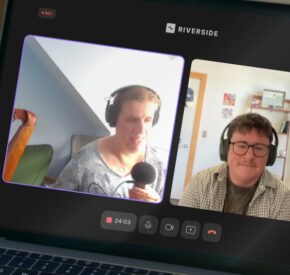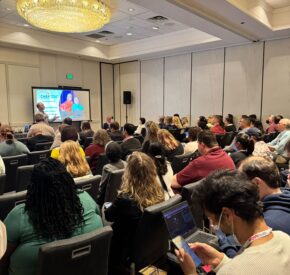Getting Comfortable With Discomfort
Article 19 explores job market challenges for people with disabilities

This episode of Article 19 dives deep into the challenges faced by people with disabilities in the job market. Host Marty Molloy chats with the insightful Kristen Witucki, an author and disability advocate, about her powerful articles for Tamman. Kristen shares her wisdom on navigating the job hunt, emphasizing the importance of perseverance and building meaningful connections. She bravely opens up about her own experiences as a blind woman, highlighting the need to overcome employer biases and the crucial role of intersectionality – recognizing how disability intersects with other forms of discrimination. Get ready to be inspired as Kristen outlines her future articles, which will explore the realities of life after landing that dream job. It’s a conversation that encourages us all to embrace discomfort and strive for a more inclusive workplace.
Meet our guests:
- Kristen Witucki is Tamman’s Accessibility Specialist and Content Creator and a published author and educator, with a passion for accessibility. She creates content for book talks, blog articles, and podcasts, while also improving processes to enhance accessibility.
Listen to more Article 19 Podcast Episodes
Full Transcript
Access the PDF Transcript
Marty Molloy
Welcome to our latest mini podcast with a returning podcaster from Article 19, Kristin Witucki. She is an author, a mentor, a teacher, a mom, I am happy to say over the course of the last few months has become a friend. And we have lots and lots to talk to her about. Because she has been writing a series of articles for Tamman. All around getting comfortable with discomfort, getting comfortable with being uncomfortable, she’s looking at employer biases in the first two articles. And in her latest article, she really looks at it from the employee lens. Hello, Kristin, it’s always nice to talk to you.
Kristen Witucki
Hello, thanks for having me again.
Marty Molloy
So, I’d like to get into just a couple of quick questions. Unlike our regular podcast, we kind of dispense with some of the extra stuff and we hit right into the meat of it. So I’m just going to jump in. This is the third article in the series that you’ve been producing for us. And the first two, as I said, focused on employers and this one on employees, is there a theme that you’ve been able to identify as you’ve been writing that has crossed all of these articles so far?
Kristen Witucki
Um, well, I hope the theme that crosses all of these is not to give up from the employer side, not to give up on potential applicants who may have more potential than they realize, due to biases and what they’ve traditionally sometimes thought of applicants or their own ability to work with them. And on the employee side, just, you know, go out there, get the experience that you can get, um, you know, really do your very best in the interview, to, you know, to show what accommodations you need, but also to show yourself beyond the disability, along with the disability, including the disability, all these things together, and, hopefully, have the perseverance to do it as many times as you need to without getting too discouraged.
Marty Molloy
You know, I totally agree with that assessment in terms of themes that have crossed everything else, I think there’s one other one that I’d like to get your take on, and that is building relationships and taking the time to build relationships, both from the employer to their prospective candidate, but especially in this latest article, you know, go putting yourself out there, and whether it’s networking or volunteering or other things that you’ve mentioned, it’s taking the time to build some relationships. Can you talk a little bit about building relationships and the importance from both sides?
Kristen Witucki
Yeah, from the employer side, I think that, you know, I’ve been fortunate enough to interview candidates for internship positions and to help when I was working in a college student program, to help with interviewing candidates for mentors, and I think for mentor positions are there. And I think that interviewing is very important, but there’s also this awkward, superficial feeling to the whole experience from both sides. But when you’re interviewing people, you know, you’re you’re almost looking for certain answers, but you’re you say you’re not because the questions are open, but you know,
Marty Molloy
Totally right.
Kristen Witucki
for these you are not looking for. And I think it can be very difficult, and I know this from both sides of the interview experience, but it can be very difficult to just remember that each person is a human being, somebody you’re going to have a conversation with, and somebody that you, your job is really to connect with. So on the employer side, you know, to connect with any applicant, to recognize their humanity, and then from there to, you know, to still make an employment decision, but based on that connection, rather than, you know, trying to push them away.
Marty Molloy
Yeah.
Kristen Witucki
And on the employee side, just networking, again, sort of, hopefully, we’ll build those bridges to connect to different people, different experiences, you know, as individuals and as human beings.
Marty Molloy
Yeah, absolutely. I don’t think there’s anyone who particularly enjoys the process of interviewing. And so thinking about, you know, if someone seems a little nervous at the start, or if someone is not hitting it on all cylinders, realizing that you’re talking to As someone who’s doing something very hard, no matter what their educational background, no matter how many times or how experienced they are, you know, they’re putting themselves out there to be judged. And that’s really, really difficult. So speaking of that, there was something in this latest article that you wrote, that really, really struck me. Social justice has been at the forefront, and in our common consciousness at a higher level, I think, especially over the
last few years. But I read what you wrote where you said that, you know, as a blind woman, acknowledging that you come from a place of privilege, I was really surprised reading that maybe I shouldn’t have. So I want you to talk a little bit, I’m hoping you just expound on that a little bit more. Because, you know, I think from my own biases, I, I certainly don’t pity someone who has more master’s degrees than the average bear and person, as you do. But I, I just found that to be striking. Can you talk a little bit more about that?
Kristen Witucki
Yeah, um, so just for full transparency, and maybe a little amusement. I added that into revision. And so it didn’t immediately cross my mind. And I think that that’s very telling of people who essentially try to live antiracist lives, but always have more work to do. But I thought about it, mostly, honestly, because of my oldest child has nothing to do with this article. But I live in a mixed race mixed ability family, where we are, my husband and I are of different races. So our kids are biracial, and we’re blind, they’re sighted. And my son was asking me, you know, kind of about our ancestors. And he was like, Well, you know, all Dad’s ancestors were, you know, were, had to fight for the freedom and your ancestors were
all evil. And i’m like, Well, okay, we, we, we weren’t slave owners, or any slave owners in our family, a lot of our ancestors were actually immigrants, and came over after slavery, but it also got me thinking well, okay, but, you know, if the history of slave owning is really the history of all of us, you know, and if I don’t get the free pass, just because my ancestors didn’t happen to own other people, you know, what did they happen to get, you know, where, how did they get ahead. And so I am still revising the conversation. You know, every single day, with my kids. So it back to the article. I do think that, you know, I, my parents were very aware of how the education system worked, they both were, white they were both college educated, they both had bachelor’s degrees, basically, you know, they knew how to work the system, and the system worked more or less for them. You know, I think my mom grew up with some, you know, some issues with male female privilege that she had to contend with. But, you know, as far as the color of her skin, I don’t think that really was as much of an impact for her or my dad. And, um, you know, I was very fortunate to have a good education, I went to good schools, I
worked hard. But I also, you know, came from people who knew how this worked, who knew what to do, when, who advocated who taught me to advocate so. And, you know, so I just think that that does have some important implications, at least with the cover letter resume stage of applying for a job. So, you know, then that may be cancelled out when I get to where the interview stage where my disability is very visible, or maybe I suck at the interview?
Marty Molloy
Well, from the times that we’ve talked, and even this is an interview, I, you know, we acknowledge it’s hard, but you’re great at interviewing, frankly. You know, it’s interesting, you know, we’re here recording in February, which is, of course, Black History Month. And I think, often in society, we tend to silo as many of these issues as possible, but the intersectionality can’t be missed when we’re talking about this. Whether it’s gender or Whether it’s race, what whatever it is that disability intersects with all of these things, and adds a layer of complication to all of it. And I think your article gets at that, I think, in a really clear way, because you even talked a little bit about, you know, gender, and interviewing with, you know, two women with another man being interviewed in that there’s a there’s a gender dynamic. So I think there’s a lot for, for us to chew on in this article, for sure.
Kristen Witucki
Thank you.
Marty Molloy
So you tackle discrimination head on, you know, we’re talking about this as being biases and things like that, even in the title of these articles. And I’ve heard it said that people with disabilities are the last group, where employers and others can be openly biased and openly discriminate against them with little or no ramifications. And this is another thing that you really do hit this very directly in the article. What, if anything, do you tell your students about sort of just the world’s willingness to discriminate, especially against people who have more visible disabilities.
Kristen Witucki
Um, so when I work with younger students, I hope that in general, I keep the the disability connection to me as a person or teacher, the disability pretty much as positive as possible and sort of explaining like, these are the possibilities, like you don’t have to just you know, you don’t have to be helpless, you can learn you can accomplish things, you can work in a field that you might be interested in working in. Um, I think for older students, you know, those in college or, you know, getting ready to look for that first internship or their first job, I really want them to take the lead on explaining, you know, how they’re feeling about these experiences. Um, I, I do think there’s a risk there, of minimizing the biases that people might face as they go into the world. But I also, you know, I think it’s important to build on their experiences, and to come from where they are, where they are, and where they’re experiencing discrimination or biases, because, you know, not all of them, will experience it, not all of them want to talk to me about it. And I really just want to encourage people to get out there for the first or 57th time and, you know, do their best, and then, you know, learn from what they’ve done.
Marty Molloy
Yeah, that’s, that’s brilliant. I just so appreciate the vulnerability that you’ve shared in these articles. And it’s it, it makes it that much more powerful, I think, for the reader when they’re engaging with it. So I just want to acknowledge that and the way that you’re willing to not make it all about your lived experience, but really share enough so that the reader can take a moment and walk for a few minutes that they’re reading it in your shoes. So I want to acknowledge that. And I really, definitely appreciate it.
Kristen Witucki
Thank you, I appreciate yours, too, because one of your stories made it into one of the articles.
Marty Molloy
Well, we’re always looking to be to share our words at Tamman. Because I think that’s honestly one of the ways that we’ve grown. And one of the ways we can continue to grow is to say, we know we’re not perfect at this, and we’re creating spaces where some of these harder conversations can be, can be had from the perspective of learning and growth, rather than a place of fear holding your tongue or not addressing it, which would good Lord be you know, the worst. Um, so where Where are you taking us next with the series? Where do you what do you anticipate talking about as this continues to roll on?
Kristen Witucki
Well, the first article of, for employees or prospective employees with disabilities concluded with the interview process, and it was already getting pretty long. And so we at Tamman made a joint decision to stop it there. So I think it’s sort of hilarious because it exactly mirrors the anxious experience of waiting for the decision. So it gave me a chance to joke around about that in my conclusion. And so the next part is, what happens if you get the job? What happens if you don’t get the job. All those feelings, I get to put them off for a week or two and then dive in and do that. So
Marty Molloy
Wonderful, wonderful. Well, I know I’m going to be looking forward to reading it. I really want to thank you for taking some time to hop on to this mini podcast, you can find Kristen’s writings on any of our social media platforms, LinkedIn, Instagram, Twitter, Facebook, at Tamman Inc. You can also go directly to our website, which is Tamman inc.com. And you’ll find all of her writings as well as this video and podcast there as well. Kristin, I love working with you. Let’s keep it going. I really appreciate it. And I want to thank everybody who’s taking the time to read, engage and listen, and we’ll talk to you down the road. Bye.
Kristen Witucki
Take care.





